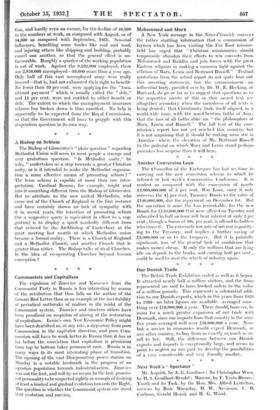A Bishop on Schism The Bishop of Gloucester's " plain
question " regarding Methodist Union will seem to most people a strange and very gratuitous question. " Is Methodist unity," he asks, " undertaken as a step towards a greater Christian unity; or is it intended to make the Methodist organiza- tion a more effective means of promoting schism ? " The term schism is capable of more than one inter- pretation. Cardinal Bourne, for example, might read into it something different from the Bishop of Gloucester. But to attribute to • the now united Methodists, who came out of the Church of England in the first instance and have certainly shown no lack of sympathy with it in recent years, the intention of promoting schism (for a suggestive query is equivalent in effect to a sug- gestion). is to display a spirit markedly different from that evinced by the Archbishop of Canterbury at the great meeting last month at which Methodist union became a formal reality. There is a Church of England and a Methodist Church, and another Church that is greater than either. The Bishop talks of rival Churches. Is the idea of co-operating Churches beyond human conception ?
* * * *


























































 Previous page
Previous page